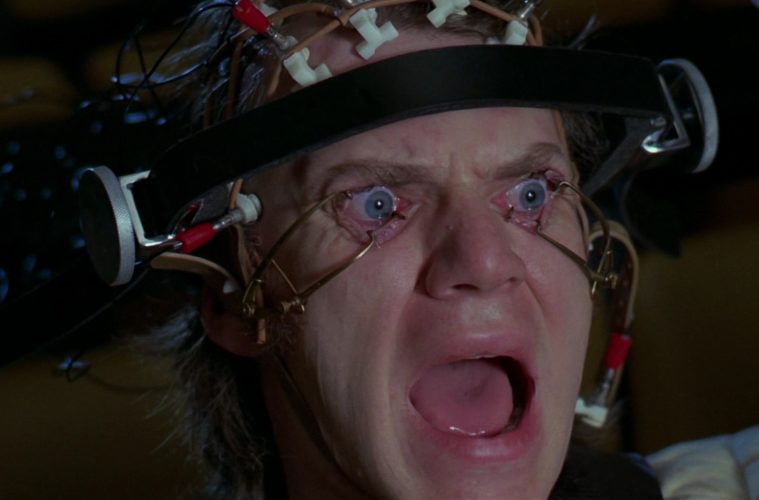
Pushing boundaries on both the technical and story level, there were more than a few times in Stanley Kubrick‘s career that he stirred up controversy. Following debates around Lolita and Paths of Glory, he hit a peak with A Clockwork Orange, a film which was banned in Britain for nearly three decades.
Around the time of its resurface in 1999, after Kubrick’s death, Channel 4 produced the documentary Still Tickin´: The Return of A Clockwork Orange, which looks at the “demonic level of attention, and its influence on culture, politics and society, which led to the director’s self-imposed ban.” Featuring interviews with Malcolm McDowell, Sam Mendes, Mary Harron, and more, check out the three-part documentary below. We’ve also included a quote from Kubrick about the reaction, a 30-minute talk with McDowell and writer Anthony Burgess around the release, and lastly, a well-done fan poster winking to another classic and a scene from the film.
How do you explain the kind of fascination that Alex exercises on the audience?
I think that it’s probably because we can identify with Alex on the unconscious level. The psychiatrists tell us the unconscious has no conscience — and perhaps in our unconscious we are all potential Alexes. It may be that only as a result of morality, the law and sometimes our own innate character that we do not become like him. Perhaps this makes some people feel uncomfortable and partly explains some of the controversy which has arisen over the film. Perhaps they are unable to accept this view of human nature. But I think you find much the same psychological phenomena at work in Shakespeare’s Richard III. You should feel nothing but dislike towards Richard, and yet when the role is well played, with a bit of humour and charm, you find yourself gradually making a similar kind of identification with him. Not because you sympathize with Richard’s ambition or his actions, or that you like him or think people should behave like him but, as you watch the play, because he gradually works himself into your unconscious, and recognition occurs in the recesses of the mind. At the same time, I don’t believe anyone leaves the theatre thinking Richard III or Alex are the sort of people one admires and would wish to be like.
Some people have criticized the possible dangers of such an admiration.
But it’s not an admiration one feels, and I think that anyone who says so is completely wrong. I think this view tends to come from people who, however well-meaning and intelligent, hold committed positions in favour of broader and stricter censorship. No one is corrupted watching A Clockwork Orange any more than they are by watching Richard III. A Clockwork Orange has received world-wide acclaim as an important work of art. It was chosen by the New York Film Critics as the Best Film of the year, and I received the Best Director award. It won the Italian David Donatello award. The Belgian film critics gave it their award. It won the German Spotlight award. It received four USA Oscar nominations and seven British Academy Award nominations. It won the Hugo award for the Best Science-Fiction movie.
It was highly praised by Fellini, Bunuel and Kurosawa. It has also received favourable comment from educational, scientific, political, religious and even law-enforcement groups. I could go on. But the point I want to make is that the film has been accepted as a work of art, and no work of art has ever done social harm, though a great deal of social harm has been done by those who have sought to protect society against works of art which they regarded as dangerous.


